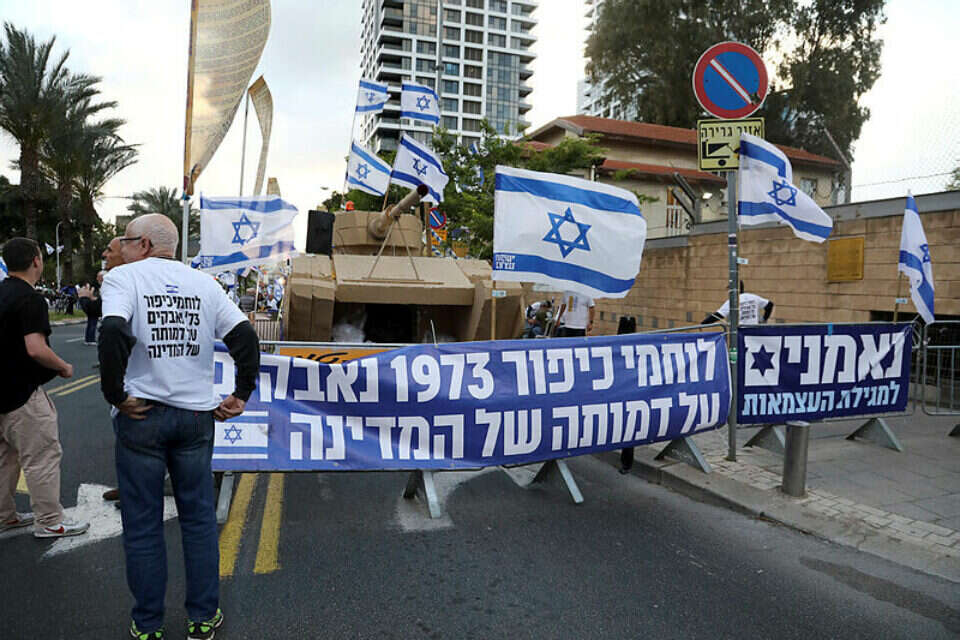Followers of the religion of democracy, who took to the streets for months to protest against the reform, now face the challenge of fundamentalism, a well-known internal challenge in the three monotheistic religions.
In his book "Farewell to Srulik," Prof. Oz Almog discusses the change in values in the Israeli elite, including the rise of democratic faith. This, like any religion, includes rituals of democracy, such as self-worship, and even a secular Rebbe such as Aharon Barak and the High Court of Justice as a secular Sanhedrin.
Fundamentalism is one of the most famous and radical versions of religion. Prof. Yuval Albashan described the fundamentalists among the opponents of the reform as "the Neturei Karta of democracy" and later as the Tel Aviv faction, in contrast to the famous ultra-Orthodox Jerusalem faction. How is fundamentalism different from ordinary religious perception?
Fundamentalists see themselves as the last and necessary barrier before the deterioration of society. The sense of immediate danger leads them to perceive reality as a zero-sum game, in which there is no partial loss but loses everything. It has to do with their perception of the world as divided into black and white, good and bad, sons of light fighting the sons of darkness. Democratic fundamentalists will not portray reform advocates as adversaries, but as enemies to be defeated. This is evident in the repetitive message "We are not brothers."
Fundamentalism is characterized by selectivity. In the name of defending religion, they develop a new ideology that emphasizes certain elements of tradition while reinterpreting them. Democratic fundamentalism is reflected in the notion that democracy has only one. One professor seriously wrote that there are no two opinions about the separation of powers, either there is or there is not. And it is the fundamentalists, of course, who will decide without negotiation what is the important component. Thus, for example, elections and their results – an essential component of the definition of democracy – have become a relatively secondary component in the eyes of fundamentalists. The court, on the other hand, has become, in their eyes, the vision of all democracy at the expense of the principle of separation of powers.
Totality is another well-known hallmark of fundamentalists, who believe that only they own absolute truth. Therefore, it is impossible to negotiate, bargain and compromise with them, which are actually an essential part of the democratic process and democratic culture. Hence their reluctant, impatient and negative attitude toward the talks at the president's residence, which are perceived as an unnecessary move that interferes with the war.
In religious tradition, the halachic hierarchy is known, which states that there are particularly important commandments, which say "He shall be killed and do not pass." On the other hand, it is obligatory to transgress the other commandments if life depends on it. However, the rule is valid only in normal periods. On the other hand, in times of annihilation, during harsh decrees and existential religious struggle, the believer must sacrifice his life even on a shoe lanyard. This is evident today in the unwillingness of fundamentalists to discuss even relatively marginal elements of what remains of the reform.
The fundamentalists must have an enemy against whom they define themselves, against whom they fight and against whom they mobilize the armies of fundamentalist loyalists. Even before the government was formed and the reform was introduced, it was Avi Maoz and the Noam party. Only after that did the reform and its leaders become the new demons. With the suspension of the reform, the focus of the struggle changed, and it was directed towards the ultra-Orthodox, and soon, apparently, Avi Maoz will return to his status as an enemy.
The end in fundamentalists justifies the means. Threatening strategic military refusal, stealing a tank from Tel Saki, blocking roads, calling for withdrawal of funds, enlisting support from foreign elements abroad, violently breaking into Kohelet's offices, silencing opponents in public spheres, including academia, and above all, the extremists among them do not shy away from civil war. Like any religion, most believers are not fundamentalists. The question remains to what extent most adherents of democracy have the power to reject radical fundamentalism in their camp. It's not easy, ask the religious in Israel.
Wrong? We'll fix it! If you find a mistake in the article, please share with us

